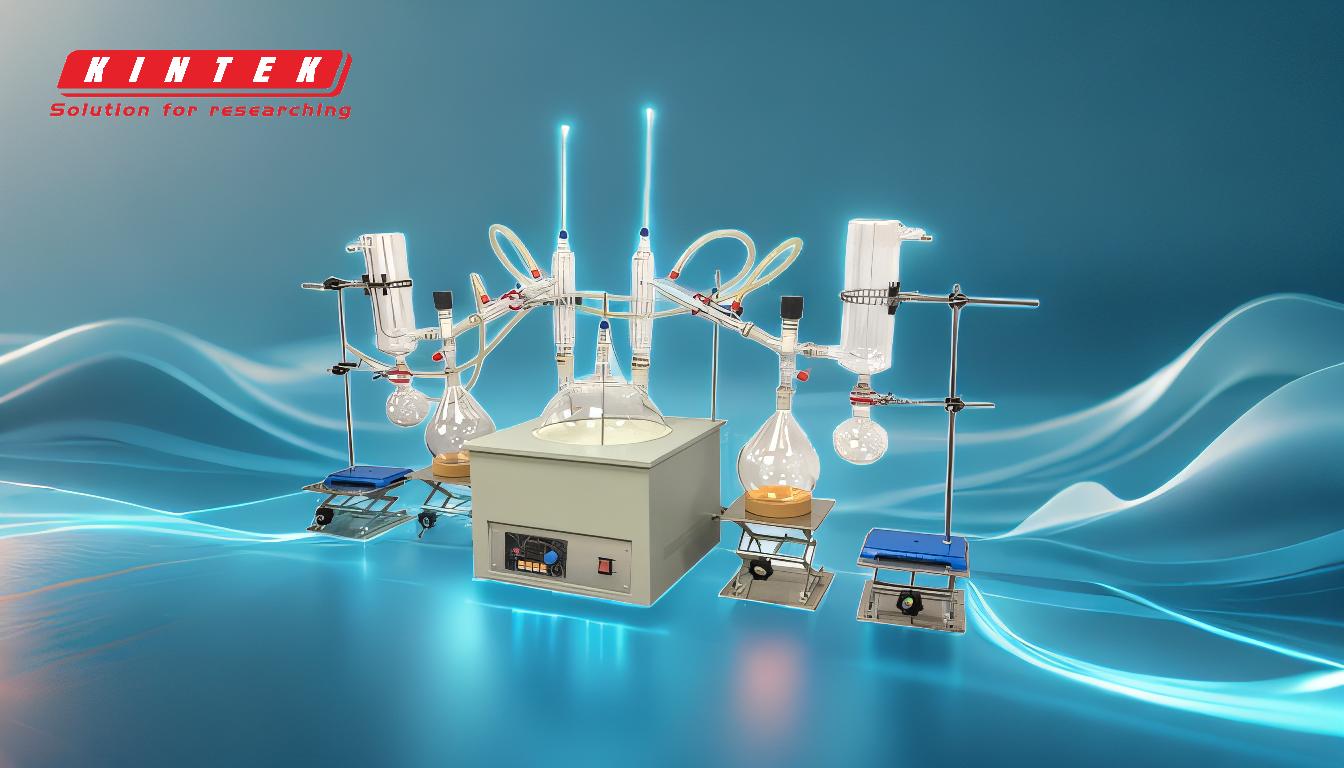Distillation is a widely used separation and purification technique that can be applied to a variety of substances, depending on the type of distillation method employed. The substances suitable for distillation include organic compounds, essential oils, volatile liquids, and heat-sensitive or high-boiling-point materials. The choice of materials for distillation equipment, such as borosilicate glass, polytetrafluoroethylene, and 304 stainless steel, ensures chemical resistance and compatibility with a wide range of substances. Below, we explore the key points related to the substances that can be used in distillation, focusing on their properties and the distillation methods best suited for them.
Key Points Explained:

-
Organic Compounds
- Organic compounds are among the most commonly distilled substances. These include alcohols, acids, esters, and other carbon-based molecules.
- Why Suitable for Distillation: Many organic compounds have distinct boiling points, making them ideal candidates for separation through distillation.
- Preferred Distillation Method: Vacuum distillation is often used for organic compounds, especially those with high boiling points or sensitivity to heat, as it reduces the boiling point under reduced pressure.
-
Essential Oils
- Essential oils, derived from plants, are volatile and aromatic compounds used in perfumes, cosmetics, and aromatherapy.
- Why Suitable for Distillation: Essential oils are typically heat-sensitive and require gentle separation methods to preserve their aromatic properties.
- Preferred Distillation Method: Steam distillation is commonly used for essential oils, as it allows for the extraction of volatile compounds without excessive heat exposure.
-
Volatile Liquids
- Volatile liquids, such as solvents, are substances that evaporate quickly at relatively low temperatures.
- Why Suitable for Distillation: Their low boiling points make them easy to separate from mixtures using distillation.
- Preferred Distillation Method: Simple distillation or fractional distillation is often employed for volatile liquids, depending on the complexity of the mixture.
-
Heat-Sensitive Materials
- Heat-sensitive materials include compounds that degrade or decompose when exposed to high temperatures, such as certain pharmaceuticals, vitamins, and natural extracts.
- Why Suitable for Distillation: Distillation methods that operate at lower temperatures, such as molecular distillation, are ideal for these materials.
- Preferred Distillation Method: Molecular distillation is particularly effective for heat-sensitive materials due to its low operating temperature and short retention time, minimizing the risk of thermal degradation.
-
High-Boiling-Point Materials
- High-boiling-point materials, such as heavy oils, waxes, and some polymers, require specialized distillation techniques.
- Why Suitable for Distillation: These materials often decompose at their normal boiling points, so distillation under reduced pressure is necessary.
- Preferred Distillation Method: Vacuum distillation or molecular distillation is used to lower the boiling point and prevent decomposition.
-
Easily Oxidized Materials
- Easily oxidized materials, such as certain fatty acids and natural extracts, are prone to degradation when exposed to oxygen.
- Why Suitable for Distillation: Distillation methods that minimize exposure to air and operate under inert atmospheres are ideal for these materials.
- Preferred Distillation Method: Molecular distillation, which operates under high vacuum and short retention times, is particularly effective for easily oxidized materials.
-
Materials Requiring High Purity
- Some applications, such as pharmaceuticals and high-purity chemicals, demand extremely pure substances.
- Why Suitable for Distillation: Distillation is one of the most effective methods for achieving high levels of purity.
- Preferred Distillation Method: Fractional distillation or molecular distillation is often used to achieve the required purity levels.
-
Equipment Materials and Compatibility
- The choice of materials for distillation equipment, such as borosilicate glass, polytetrafluoroethylene (PTFE), and 304 stainless steel, is critical for ensuring compatibility with the substances being distilled.
- Borosilicate Glass: Ideal for most laboratory applications due to its chemical resistance and transparency.
- Polytetrafluoroethylene (PTFE): Used for seals and gaskets due to its excellent chemical resistance and non-reactivity.
- 304 Stainless Steel: Suitable for industrial applications involving corrosive substances or high temperatures.
In summary, distillation is a versatile technique that can be applied to a wide range of substances, from volatile liquids to heat-sensitive and high-boiling-point materials. The choice of distillation method and equipment materials depends on the specific properties of the substances being distilled, ensuring efficient separation and preservation of their integrity.
Summary Table:
| Substance Type | Properties | Preferred Distillation Method |
|---|---|---|
| Organic Compounds | Distinct boiling points, heat sensitivity | Vacuum Distillation |
| Essential Oils | Heat-sensitive, volatile, aromatic | Steam Distillation |
| Volatile Liquids | Low boiling points, quick evaporation | Simple or Fractional Distillation |
| Heat-Sensitive Materials | Degrade at high temperatures | Molecular Distillation |
| High-Boiling-Point Materials | Decompose at normal boiling points | Vacuum or Molecular Distillation |
| Easily Oxidized Materials | Prone to degradation in the presence of oxygen | Molecular Distillation |
| High-Purity Materials | Require extremely pure substances | Fractional or Molecular Distillation |
| Equipment Materials | Borosilicate glass, PTFE, 304 stainless steel for compatibility and resistance | N/A |
Need help selecting the right distillation method or equipment? Contact our experts today for personalized guidance!









